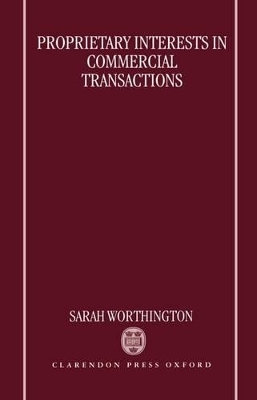
Proprietary Interests in Commercial Transactions
Seiten
1997
Clarendon Press (Verlag)
978-0-19-826275-6 (ISBN)
Clarendon Press (Verlag)
978-0-19-826275-6 (ISBN)
This work provides a broad overview of personal property law in a commercial context. It examines the various devices used by contracting parties and attempts to distil a theoretical rigorous analytical framework to describe the relevant laws.
One of the most pressing problems now facing commercial lawyers is to explain the principles which determine when a remedy is proprietary and when it is not. This book provides a broad overview of the subject. It examines representative business transactions which commonly give rise to legal or equitable interests in personal property. Its aim is to distil the fundamental principles understanding the relevant legal analyses. The result is to provide a more theoretically rigorous analytical framework for proprietary interests in personal property. The practical advantages of this are potentially twofold: new commercial transactions can be more effectively structured; in addtion, disputes between contracting parties can be more reliably resolved. Two features of the analysis are significant. The first is the elastic nature of proprietary interests in personal property. Although proprietary interests can be broadly classified as ownership or security interests, these are relative concepts which may be affected significantly by impinging contractual arrangements. The second feature is the necessary and intimate integration of law and equity. Equitable proprietary interests are remarkabldy prevalent; this prevalence is directly related to the apparent ease with which equity is able to convert particular personal obligations into proprietary interests.
One of the most pressing problems now facing commercial lawyers is to explain the principles which determine when a remedy is proprietary and when it is not. This book provides a broad overview of the subject. It examines representative business transactions which commonly give rise to legal or equitable interests in personal property. Its aim is to distil the fundamental principles understanding the relevant legal analyses. The result is to provide a more theoretically rigorous analytical framework for proprietary interests in personal property. The practical advantages of this are potentially twofold: new commercial transactions can be more effectively structured; in addtion, disputes between contracting parties can be more reliably resolved. Two features of the analysis are significant. The first is the elastic nature of proprietary interests in personal property. Although proprietary interests can be broadly classified as ownership or security interests, these are relative concepts which may be affected significantly by impinging contractual arrangements. The second feature is the necessary and intimate integration of law and equity. Equitable proprietary interests are remarkabldy prevalent; this prevalence is directly related to the apparent ease with which equity is able to convert particular personal obligations into proprietary interests.
| Erscheint lt. Verlag | 16.1.1997 |
|---|---|
| Verlagsort | Oxford |
| Sprache | englisch |
| Maße | 163 x 242 mm |
| Gewicht | 617 g |
| Themenwelt | Recht / Steuern ► EU / Internationales Recht |
| Recht / Steuern ► Privatrecht / Bürgerliches Recht ► Sachenrecht | |
| ISBN-10 | 0-19-826275-2 / 0198262752 |
| ISBN-13 | 978-0-19-826275-6 / 9780198262756 |
| Zustand | Neuware |
| Haben Sie eine Frage zum Produkt? |
Mehr entdecken
aus dem Bereich
aus dem Bereich
Gesetz über das Wohnungseigentum und das Dauerwohnrecht : Kommentar
Buch | Hardcover (2025)
C.H.Beck (Verlag)
CHF 124,60


